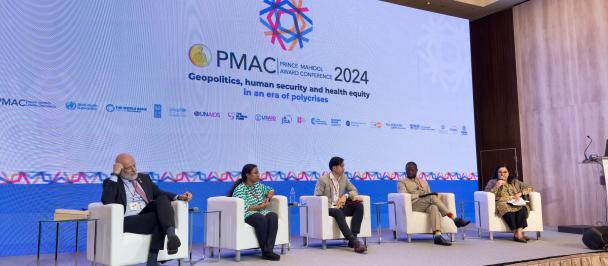Photo: UNDP Bangladesh/Fahad Kaizer.
By Keizo Takemi and Achim Steiner
Almost a year ago, we witnessed the first recorded cases of COVID-19. Since then the virus has devastated communities, systems and economies. For much of the world, and especially vulnerable populations, these past 12 months have been filled with insecurity and hardship. Driven by the common goal of ending the worst pandemic in a century, there has been unprecedented collaboration between scientists to develop effective COVID-19 vaccines and treatments.
But innovations must be matched with commensurate investments and swift action to strengthen the systems needed to roll out safe and effective vaccines worldwide to billions of people. Without major investment in readiness, distribution and equitable access, COVID-19 vaccines and therapeutics will remain out of reach for far too many people, particularly in communities already struggling to cope with the impact of the pandemic.
There have been promising signs of the kind of leadership necessary for an effective response.
Widespread cooperation around COVAX — a multilateral effort bringing together more than 180 countries to drive equitable access to successful COVID-19 vaccine candidates — and The Access to COVID-19 Tools (ACT) Accelerator — a global collaboration to accelerate development, production, and equitable access to COVID-19 tests, treatments and vaccines — illustrates that many acknowledge the need for solidarity in building a coordinated, global response. Meanwhile, some countries, like Japan, have already taken significant steps toward preparing the national systems necessary to provide free COVID-19 vaccinations to all, prioritizing the needs of the vulnerable and underserved. Many low- and middle-income countries, however, where COVID-19 has caused even further strain on health systems, do not have the capacity to act similarly.
A synchronized international effort is needed.
The U.N. secretary-general recently noted that ending the global pandemic will require sustained investment in health systems and a renewed commitment to universal health coverage, calling on countries to guarantee that health care technologies are accessible and affordable to all who need them.
We have seen how weak health systems can hinder a pandemic response.
The 2018 Ebola outbreak in the Democratic Republic of Congo proved difficult to end even as multiple vaccines were deployed alongside other public health tools due to ongoing conflict, vaccine hesitancy and underdeveloped health systems. We wrote that ensuring fair access to health care would give the world a real chance to “stop the next deadly disease outbreak before it occurs” several months before the first recorded cases of COVID-19 in 2019.
The continued spread of COVID-19 and exposure of our weak health systems clearly indicates that the world came up short. But there is still time to ensure that we can deliver vaccines and therapeutics to the communities in need, and that those communities are ready to receive them.
Countries such as Japan, with a tradition of universal health coverage and rigorous focus on health systems innovation, provide a road map of how we must work together to make equitable global vaccine readiness a reality. The government of Japan partners with the United Nations Development Programme (UNDP) in two complementary initiatives critical to universal health coverage: promoting research and development for unmet health needs and facilitating access to and delivery of medicines, diagnostics and vaccines.
The Global Health Innovative Technology Fund (GHIT) is a public-private partnership that works to accelerate the discovery and development of health technologies for neglected tropical diseases, tuberculosis and malaria. The Access and Delivery Partnership (ADP) complements this work by bringing together the World Health Organization, the Special Programme for Research and Training in Tropical Diseases and PATH to help low- and middle-income countries strengthen their health systems so that health technologies reach the people who need them.
Together, GHIT and ADP demonstrate that by investing in both research and development and health systems, we can drive faster progress on equitable access to care, end the COVID-19 pandemic and prepare for future health emergencies. High-income countries — like Japan — must come together to increase support for innovative collaborations such as GHIT, ADP and COVAX so that all countries can emerge from this pandemic safer and stronger than before.
There is both a human and an economic imperative: A recent study projected that unequal global distribution of COVID-19 vaccines could cost the world economy up to $1.2 trillion. Countries must come together and avoid the temptation of “vaccine nationalism,” because the health of people and the economy will not be safe until everyone, everywhere has access to the tools necessary to end this pandemic.
New technological advancements are crucial to curbing the spread of COVID-19, but they are not a silver bullet. Health, development and human security the world over will be at great risk if communities do not have timely access to both new innovations and strong health systems capable of delivering them equitably. Universal health coverage is also crucial for addressing inequality. Investing in stronger health systems and accelerating progress toward universal health coverage through domestic efforts and global cooperation will ensure bridging the gap between the rich and the poor, as well as smoother and more equitable distribution of health technologies, while helping to protect everyone through the pandemic and beyond.
Keizo Takemi is a member of Japan’s Upper House and is the World Health Organization goodwill ambassador for universal health coverage. Achim Steiner is administrator of the United Nations Development Programme.
This article was originally published in the Japan Times.

 Locations
Locations




